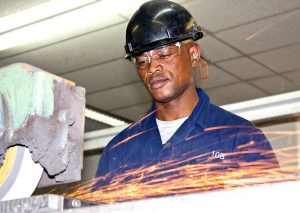This Jewish woman working in the software engineering field shares her work experiences and what it is like to be a woman in a field dominated by men. She enjoys creating things, which makes her job particularly exciting, but that desire to create has also lead her to a career on the side as a writer.
Q: What is your job title and what industry do you work in? How many years of experience do you have in this field? How would you describe yourself using only three adjectives?
A: My job title is Software Engineer and I work in the Information Technology field. I have approximately 17 years of experience developing and deploying software systems. I would describe myself as driven, intelligent and kind.
Q: What’s your ethnicity and gender? How has it hurt or helped you? If you ever experienced discrimination, how have you responded and what worked best?
A: I am a Jewish female. Being a Jewish female has helped in some positions, but has definitely been a roadblock in others. I have experienced discrimination in the workplace, mainly for being female. However, I am not sure that this could be considered true gender-based discrimination. When I was starting out, the males in my field in the mid-1990’s were simply not accustomed to working with females. Everyone had to adjust when the influx of women began in traditionally male industries. Today, however, I do not feel that I am a victim of any kind of discrimination.
Q: How would you describe what you do? What does your work entail? Are there any common misunderstandings you want to correct about what you do?
A: The position of Software Engineer is really defined by the company. As a Software Engineer, you may be tasked with development of software applications, or you may be asked to be a member of a design team. The design team specifies the requirements of the software product, as well as how they will be met by the software team. Software Engineers may also be members of Deployment or Testing teams, responsible for installing or testing the application.
Q: On a scale of 1 to 10 how would you rate your job satisfaction? What might need to change about your job to unleash your full enthusiasm?
A: On a scale of 1 to 10, I would rate my job at about a 7. No job or company is perfect. However, in general in the workforce, the politics and personalities are usually the main cause of my frustration, and not the job itself.
Q: If this job moves your heart – how so? Ever feel like you found your calling or sweet spot in life? If not, what might do it for you?
A: Actually, I am a writer in my heart. I know that my calling is writing. However, because software development and writing actually utilize opposite sides of the brain, or so I’m told, there is a different satisfaction I get from working as a Software Engineer. Writing is something that comes so naturally to me, but application development is not. I get a lot of satisfaction being able to master something that does not come easy for me.
Q: Is there anything unique about your situation that readers should know when considering your experiences or accomplishments?
A: In addition to being a Software Engineer, I am also a freelance writer. I write mainly technical pieces, but have been known to opine on occasion.
Q: How did you get started in this line of work? If you could go back and do it differently, what would you change?
A: I was introduced to programming when I was in graduate school. I was actually working on a PhD in Sociology at the University of Illinois. I discovered HTML programming and was able to instantly pick it up. I just looked at HTML code and immediately understood it without any explanation. I took this as a sign.
I did not go to school specifically for Software Engineering. This was most likely because in the early 1990’s, the Information Technology industry was still very new. Colleges did not offer very many classes in Computer Science, much less in Software Development. Over time, this has changed and now, most schools have a technical cirriculums that incudes programming and software engineering specialties.
Q: What did you learn the hard way in this job and what happened specifically that led up to this lesson?
A: I learned that I may be smart, but I am never the smartest one in the room. However, I have noticed that many folks who work in the IT industry are very impressed with their own intelligence and knowledge. Not only are you constantly having to prove yourself, but dealing with all those egos is tiring at times.
Q: What is the single most important thing you have learned outside of school about the working world?
A: Life is hard and not everyone is a liberal thinker. When you get out into the “real” world, you deal with all kinds of people, cultures and ideas. I feel that I was sheltered while in school, and I experienced a somewhat rude awakening after working in the workforce for about a year or so.
Q: What’s the strangest thing that ever happened to you in this job?
A: The strangest thing that ever happened to me in this field was having the opportunity to make great money before the field caught up with the demand. IT people were hard to come by in the mid- to late- 1990s. If you were good and had experience, you were golden. This changed in the new millennium, however. The field has become very competitive.
Q: Why do you get up and go to work each day? Can you give an example of something that really made you feel good or proud?
A: I love to create. The idea that I get to create every day of my life, whether writing or developing software, is amazing to me. Just to sit and make something from absolutely nothing except your own thoughts just thrills me every time I think about it.
Q: What kind of challenges do you handle and what makes you want to just quit?
A: Without a doubt, the thing that makes me want to quit the field is politics. Because software jobs are generally well-paying, there are a lot of corporate politics that swirl around positions, promotions and the corporate culture in general.
Q: How stressful is your job? Are you able to maintain a comfortable or healthy work-life balance? How?
A: This is a complicated question because the job itself is as stressful as you allow. I could, and have, let a development project totally take over my life. I’ve sat in the same chair for 24 hours straight, and maybe even longer, to avoid stopping and then having to pick up the project later and figure out what I was doing when I stopped. This does not promote a healthy balance, but I’ve gotten to where I will only do this now about once or twice a year. To maintain a healthy balance, you absolutely have to set boundaries for yourself. For example, I have a standing rule that I do not ever work on Sundays, no matter what is happening. There have been rare occasions when I have to break my covenant with myself, but maybe only two or three occasions.
Q: What’s a rough salary range for the position you hold? Are you paid enough and/or happy living within your means?
A: The compensation for a Software Engineer is quite attractive. The salary range for my position is between 80 k and 200 k per year. The upper end of the range applies to those in network and system security. However, a person just entering the field probably could not initially command an 80 k salary. However, with some experience and a few successful development projects, you can achieve some pretty hefty compensation goals.
Q: How much vacation do you take? Is it enough?
A: I rarely take vacations, and I need to take them. In the past couple of years, I have taken at least a month off during the year. However, the month “off” usually entails taking on a full-time writing assignment and utilizing the other side of my brain.
Q: What education and skills do you need to get hired and succeed in this field?
A: At this time, you need at least an Associate’s degree, but this would be to simply get your foot in the door in a low level position. For a substantial job with some status and good pay, you really need to have a Bachelor’s degree. A Master’s will put you ahead of the crowd.
Success in this field is much more dependent on your aptitude and personality. What you learn in school will most likely be obsolete in a few years. If you can learn how to learn technical processes and procedures in school, this will take you far in the field.
Q: What would you tell a friend considering your line of work?
A: If I feel that my friend has an aptitude for the field, I would encourage them. However, if my friend is simply looking for good money and is not particularly interested in Information Technology, I would advise against it.
Q: If you could write your own ticket, what would you like to be doing in five years?
A: I would like to develop some amazing piece of software and retire on my laurels. Think Facebook!




 Are you handy and interested in a career where you can use your hands? In this interview with an apartment maintenance worker, he shares how through his faith and job training, he has been able to turn his life around, from dealing drugs and spending time in prison, to becoming a family man with a steady job who shares his faith with anyone who will hear.
Are you handy and interested in a career where you can use your hands? In this interview with an apartment maintenance worker, he shares how through his faith and job training, he has been able to turn his life around, from dealing drugs and spending time in prison, to becoming a family man with a steady job who shares his faith with anyone who will hear. On a scale of 1 to 10 how would you rate your job satisfaction? What might need to change about your job to unleash your full enthusiasm?
On a scale of 1 to 10 how would you rate your job satisfaction? What might need to change about your job to unleash your full enthusiasm?

 S. Jessop shares her unique experience being a truck driver for an oil rig in this career interview. She shares what it was like having men not want her on their rigs just because she was female, and how she constantly has to work harder than others in her field to prove herself because of her gender. Whether you are male or female, if you’re thinking about a career in truck driving, this interview is for you!
S. Jessop shares her unique experience being a truck driver for an oil rig in this career interview. She shares what it was like having men not want her on their rigs just because she was female, and how she constantly has to work harder than others in her field to prove herself because of her gender. Whether you are male or female, if you’re thinking about a career in truck driving, this interview is for you!


 In this career interview, a nurse for a non-profit mental health organization shares how she has struggled to overcome the major obstacles she has faced, such as being a single mother, surviving cancer, and recovering from a crippling injury. While she still faces physical, emotional, and financial challenges today, she is driven to get up each day by a desire to create a positive change in the world around her.
In this career interview, a nurse for a non-profit mental health organization shares how she has struggled to overcome the major obstacles she has faced, such as being a single mother, surviving cancer, and recovering from a crippling injury. While she still faces physical, emotional, and financial challenges today, she is driven to get up each day by a desire to create a positive change in the world around her.